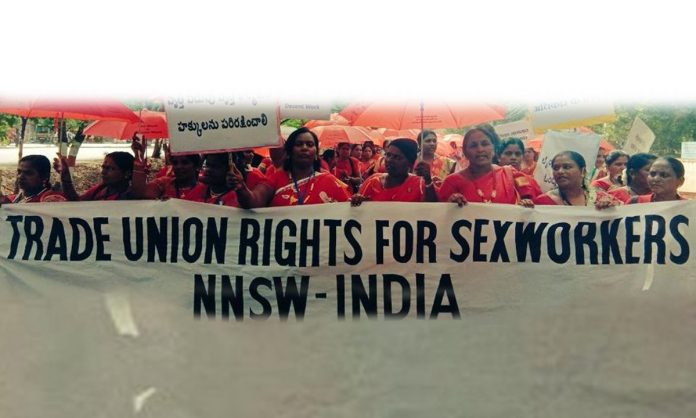What made the Supreme Court ask state governments to provide allowances and rations to them? It relates to the peculiar situation governing sex workers.
By Sujit Bhar
The Supreme Court recently asked all state governments to assure that dry rations and other allowances reach sex workers across the country. This was an extraordinary move, coming out of an appeal to the effect by Durbar Mahila Samanwaya Committee, an organisation that works for the benefit of sex workers.
When there is a national policy about distribution of relief material during this pandemic, why did the top court have to come out and issue a special order? And why were sex workers denied relief in the first place?
This was because of the peculiar situation that sex workers in the country as well as in many other countries find themselves in. Prostitution in this country is not illegal. Technically, a sex worker can carry on her trade without the fear of law. However, there are stipulations in place that make this very act of the sex worker impossible. Pimping, for example, is illegal. Also illegal would be existence of a place a brothel or such where prostitution can take place. Even soliciting for sex by a prospective client is illegal.
Is there, then, a logical and legal way in which prostitution can happen, through which a sex worker can earn her living? Unlikely. More importantly, there is complete opacity in the very status of a sex worker in society. While the National Crime Records Bureau (NCRB) religiously records actions for and against sex workers, noting down data, no national census would want to touch them. So how is this large swathe of marginalised population represented?
Sex workers are treated the same way as beggars, so they can be prosecuted either through the Immoral Traffic (Prevention) Act, 1956, and/or any of the many anti-beggary laws of the different states, such as the Hyderabad Prevention of Beggary Act, 1941, The Bengal Vagrancy Act, 1945, The Bombay Prevention of Beggary Act, 1945, The Madras Prevention of Beggary Act, 1945, and so on.
This lack of status of prostitutes has not only resulted in the legal issues that germinate, but there are also major administrative issues as well. No government can logically allocate money in the Budget for sex workers. That would be budgeting for allocations to beggars. Sex workers have vehemently opposed this somewhat demeaning idea of categorising them as beggars. They have claimed that their incomes are legitimate and they even want to pay income tax on their incomes, if their source is legalised. But social taboos are strong to break and no government wants to antagonise social activists and influencers.
Those are interesting reasons that required the Supreme Court to intervene. The Court ordered dry rations and even Rs 5,000 per month for allowances (cash transfers), among other things. The interesting issue that comes out of this is that in doing this, the top court has touched upon a sore that has been festering since time immemorial.
Read Also: Mumbai court grants bail to Shirish Pattanshetty, owner of the Fakt Marathi channel in fake TRP case
Sex trade is as old as civilisation. Certain countries have legalised it and are now able to control it and even draw revenue from it. In India, even thinking on these lines would be tantamount to sacrilege.
However, in dealing with this issue directly, the Supreme Court has managed to put on record the importance of governmental care for this section of society. Also, it has drawn, in bold lines, a picture of a marginalised section of society that has been neglected and kept out of hundreds, if not thousands of government benefits that are formulated year after year. The order makes it clear that sex workers do exist and they too need help from their elected representatives in government.
When on September 6, 2018, the Supreme Court passed a landmark judgment, by which it said that the application of Section 377 (of the IPC) to consensual homosexual sex between adults was unconstitutional, “irrational, indefensible and manifestly arbitrary”, there was jubilation among the “rainbow” population of the country. It is time that the Court also takes a look at the status and plight of the sex workers. Every act that purports to “protect” women from sex trade ends up punishing the sex workers themselves. Living plumb in the middle of society, they are social outcasts, financially marginalised and legally nonexistent.
Read Also: Athena Legal Update – Code on Wages, 2019
It is this ostrich attitude by governments that has allowed discrimination to survive, for them being kept out of financial outreach programmes and for criminal activities to grow. Sex workers were victimised once, when they were forcibly brought into the trade by unscrupulous men, they are being victimised again, through the sheer inaction of governments. Think of one election that happens, without prospective candidates not venturing into these so called “red light areas” of the city. Their votes are critical to the survival of the political party, not their lives, per se.
It is essential for social activists to take these pronouncements by the top court and form a movement. It is now possible for all to call a spade a spade, as the top court has allowed that. It might soon be possible for society to grow up and realise that this was something they always had. It is a necessary part of the social system.



Comments are closed.